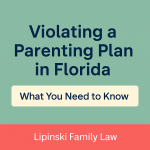How Florida Courts Decide on Emergency Custody
When a child’s safety is at risk, time matters. That’s why Florida courts allow for emergency custody petitions—a legal tool designed to protect children from immediate harm.
But how do courts decide what qualifies as an emergency? And what happens after you file?
At Lipinski Family Law, we help parents navigate these urgent, high-stakes cases with compassion and speed. Here’s what you need to know if you’re considering emergency custody in Florida.
⚖️ What Is Emergency Custody in Florida?
Emergency custody (also called an emergency motion for temporary custody) is a request for the court to make a fast, temporary change to a parenting plan or timesharing schedule—often without waiting for a full hearing.
These motions are typically reviewed within 48 hours and can result in temporary sole custody or restrictions on the other parent.
🚨 What Qualifies as an Emergency?
Florida courts are very specific about what constitutes an “emergency.” Some valid reasons include:
- Abuse or neglect (physical, emotional, or sexual)
- Abandonment or sudden disappearance
- Substance abuse or serious mental health episodes
- Threats of harm to the child or others
- Violation of an existing custody order that endangers the child
It’s not enough for a parent to be late to pickups or disagreeable—there must be a real and immediate danger to the child’s safety or well-being.
📑 What Evidence Should You Provide?
The success of an emergency custody petition often comes down to proof. Useful evidence includes:
- Police reports or DCF (Department of Children and Families) records
- Medical or psychological evaluations
- Texts, emails, or voicemails indicating danger or erratic behavior
- Eyewitness affidavits (from teachers, neighbors, relatives, etc.)
The more specific and factual your evidence is, the better your chances.
⏱️ What Happens After You File?
Here’s a general timeline of what to expect:
- Emergency Review: The judge reviews your motion within 24–48 hours.
- Immediate Order (if granted): The court may issue a temporary order ex parte (without a hearing).
- Hearing Set: A full hearing will follow within a few days to weeks.
- Follow-Up Orders: The judge can extend, modify, or cancel the emergency order after hearing both sides.
In some cases, emergency custody leads to a permanent change in timesharing if the danger continues.
⚖️ Do I Need an Attorney?
While it’s possible to file an emergency motion without a lawyer, having a family law attorney increases your chances of success—especially when time and safety are on the line.
At Lipinski Family Law, we act quickly to file urgent motions, gather evidence, and appear before the court on short notice. You don’t have to navigate this alone.
📝 Bottom Line
Emergency custody in Florida is a powerful legal remedy—but one that must be used with care, evidence, and urgency.
If you’re concerned for your child’s safety, don’t wait.
📞 Contact us today to explore your options and protect what matters most.
Helpful links.



